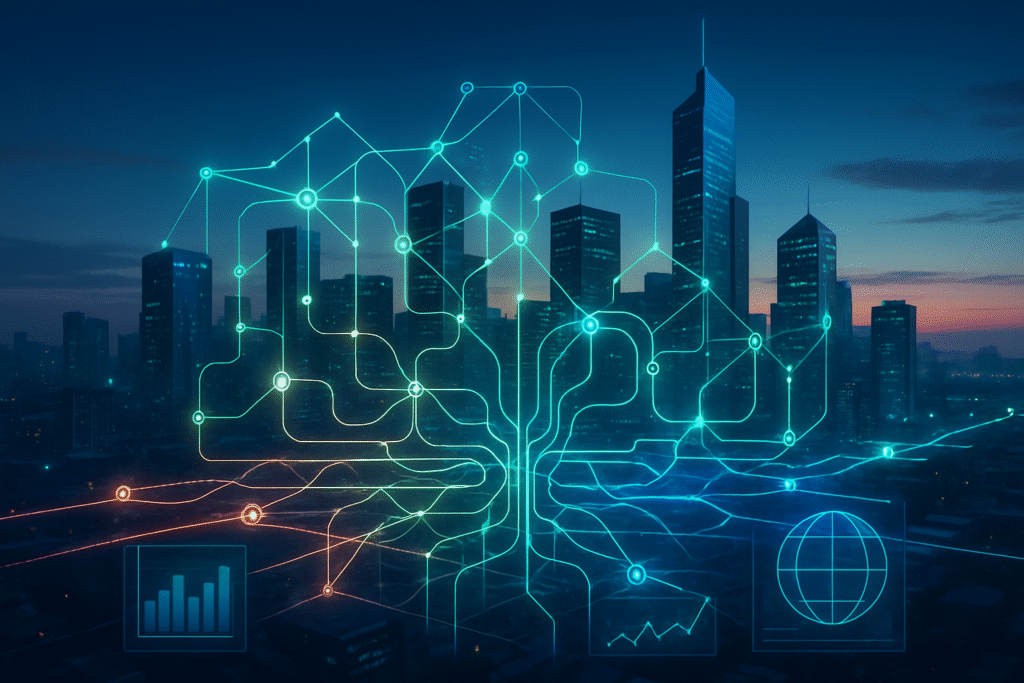Financial News
Hitachi Energy Fuels India’s AI Ambitions with ₹2,000 Crore Chennai Innovation Hub Expansion

Chennai, India – October 15, 2025 – In a monumental boost for India's burgeoning technology landscape and the global push towards sustainable energy, Hitachi Energy today announced a substantial investment of ₹2,000 crore (approximately $250 million) to significantly expand its Global Technology and Innovation Centre in Chennai. This strategic move, unveiled on this very day, is poised to create an impressive 3,000 new, high-value technology jobs, further solidifying India's position as a critical hub for advanced research and development in the energy sector.
The expansion underscores Hitachi Energy's commitment to accelerating innovation, digitalization, and engineering capabilities, with a keen focus on developing cutting-edge sustainable energy solutions. The Chennai centre, already a powerhouse employing over 2,500 energy transition technologists, is set to become an even more formidable strategic global hub, consolidating diverse engineering and R&D expertise to serve both India and the world.
Powering Tomorrow: AI and Digitalization at the Core of Chennai's Expanded Hub
The ₹2,000 crore investment is earmarked for a comprehensive upgrade and expansion of the Chennai facility, transforming it into a nexus for next-generation energy technologies. At the heart of this transformation lies an aggressive push into digitalization and advanced artificial intelligence (AI) applications. The centre's enhanced capabilities will span critical areas including advanced grid automation, high-voltage systems, HVDC (High Voltage Direct Current) technologies, and seamless grid integration, all underpinned by sophisticated AI and machine learning frameworks.
A key differentiator for the expanded centre will be its focus on "cutting-edge projects like development of digital twins and advanced grid automation applications." Digital twins, virtual replicas of physical assets, leverage AI for real-time data analysis, predictive maintenance, and optimized operational performance, enabling unprecedented levels of efficiency and reliability in energy infrastructure. Similarly, advanced grid automation, powered by AI, promises intelligent control, proactive fault detection, and enhanced resilience for complex power grids. This forward-thinking approach significantly deviates from traditional, often reactive, energy management systems, ushering in an era of predictive and self-optimizing energy networks. Initial reactions from the AI research community and industry experts highlight this as a pivotal step towards integrating AI deeply into critical infrastructure, setting a new benchmark for industrial digitalization.
Beyond core energy technologies, the centre will also bolster its expertise in cybersecurity, recognizing the paramount importance of protecting digitized energy systems from evolving threats. AI and machine learning will be instrumental in developing robust defense mechanisms, anomaly detection, and threat intelligence to safeguard national and international energy grids. The creation of 3,000 high-value, high-paying, hi-tech jobs signals a clear demand for professionals skilled in AI, data science, advanced analytics, and complex software engineering, further enriching India's talent pool in these critical domains. The centre's capacity to manage over 1,000 projects annually across 40 countries speaks volumes about its global strategic importance.
Competitive Edge and Market Disruption: The AI Factor in Energy
This significant investment by Hitachi Energy (NSE: HITN) is poised to create substantial ripples across the energy sector, benefiting not only the company itself but also a broader ecosystem of AI companies, tech giants, and startups. Hitachi Energy stands to gain a considerable competitive advantage by spearheading the development of AI-driven sustainable energy solutions. Its consolidated global R&D hub in Chennai will enable faster innovation cycles and the creation of proprietary AI models tailored for grid optimization, renewable energy integration, and energy efficiency.
For major AI labs and tech companies, this signals a growing demand for industrial AI expertise. Companies specializing in AI for IoT, predictive analytics, digital twin technology, and cybersecurity will find new avenues for collaboration and partnership with Hitachi Energy. The competitive implications are significant: companies that fail to integrate advanced AI and digitalization into their energy offerings risk falling behind. This development could disrupt existing products and services by introducing more efficient, resilient, and intelligent energy management solutions, potentially making older, less automated systems obsolete. Market positioning will increasingly favor firms capable of delivering end-to-end AI-powered energy solutions, and Hitachi Energy's move strategically positions it at the forefront of this transformation. Indian AI startups, in particular, could find fertile ground for growth, offering specialized AI components, services, or even becoming acquisition targets as Hitachi Energy seeks to augment its capabilities.
A Global AI Trend Towards Sustainable Infrastructure
Hitachi Energy's investment in Chennai fits squarely within the broader AI landscape and emerging trends that prioritize the application of artificial intelligence for sustainable development and critical infrastructure. As the world grapples with climate change and the need for reliable energy, AI is increasingly recognized as a key enabler for optimizing energy consumption, integrating intermittent renewable sources like solar and wind, and enhancing grid stability. This move reflects a global shift where industrial AI is moving beyond mere efficiency gains to become a cornerstone of national resilience and environmental stewardship.
The impacts are far-reaching: enhanced energy efficiency will lead to reduced carbon footprints, while a more stable and intelligent grid will better accommodate renewable energy, accelerating the energy transition. Economically, the creation of 3,000 high-value jobs in India represents a significant boost to the local economy and reinforces India's reputation as a global tech talent hub. Potential concerns, while mitigated by the centre's focus on cybersecurity, include the ethical deployment of AI in critical infrastructure, data privacy in smart grids, and the potential for increased complexity in managing highly autonomous systems. This investment can be compared to other major AI milestones and breakthroughs where specialized AI centres are established to tackle specific societal challenges, underscoring AI's maturation from general-purpose research to targeted, impactful applications.
The Horizon: Intelligent Grids and Predictive Energy Ecosystems
Looking ahead, the expansion of Hitachi Energy's Chennai innovation centre promises a future where energy grids are not just smart, but truly intelligent and self-healing. Expected near-term developments include the deployment of advanced AI algorithms for real-time grid balancing, anomaly detection, and predictive maintenance across energy assets. In the long term, the centre is likely to drive innovations in AI-powered demand-response systems, intelligent energy trading platforms, and sophisticated microgrid management solutions that can operate autonomously.
Potential applications and use cases on the horizon are vast, ranging from AI-optimized charging infrastructure for electric vehicles to intelligent energy storage management and the creation of fully decentralized, self-regulating energy communities. Challenges that need to be addressed include the continued acquisition and retention of top-tier AI talent, the development of robust regulatory frameworks that can keep pace with AI advancements in critical infrastructure, and the complexities of integrating diverse AI systems across legacy energy infrastructure. Experts predict that this investment will significantly accelerate the adoption of AI in the global energy sector, with India playing a pivotal role in shaping the next generation of sustainable and resilient energy systems. The innovations originating from Chennai are expected to be exported globally, setting new standards for energy digitalization.
A New Chapter for AI in Sustainable Energy
Hitachi Energy's ₹2,000 crore investment in its Chennai Global Technology and Innovation Centre marks a significant milestone in the convergence of artificial intelligence and sustainable energy. The key takeaways are clear: a massive financial commitment, substantial job creation, and a laser focus on AI-driven digitalization for critical energy infrastructure. This development is not merely an expansion; it's a strategic positioning of India as a global leader in industrial AI applications for the energy transition.
Its significance in AI history lies in demonstrating how AI is moving beyond consumer applications to become an indispensable tool for tackling some of humanity's most pressing challenges, such as climate change and energy security. The long-term impact will likely manifest in more efficient, reliable, and sustainable energy systems worldwide, driven by innovations born in Chennai. In the coming weeks and months, the tech world will be watching for the first announcements of specific projects, partnerships, and breakthroughs emerging from this expanded hub, as Hitachi Energy embarks on a new chapter of powering a sustainable future with AI.
This content is intended for informational purposes only and represents analysis of current AI developments.
TokenRing AI delivers enterprise-grade solutions for multi-agent AI workflow orchestration, AI-powered development tools, and seamless remote collaboration platforms.
For more information, visit https://www.tokenring.ai/.
More News
View More




Recent Quotes
View MoreQuotes delayed at least 20 minutes.
By accessing this page, you agree to the Privacy Policy and Terms Of Service.



